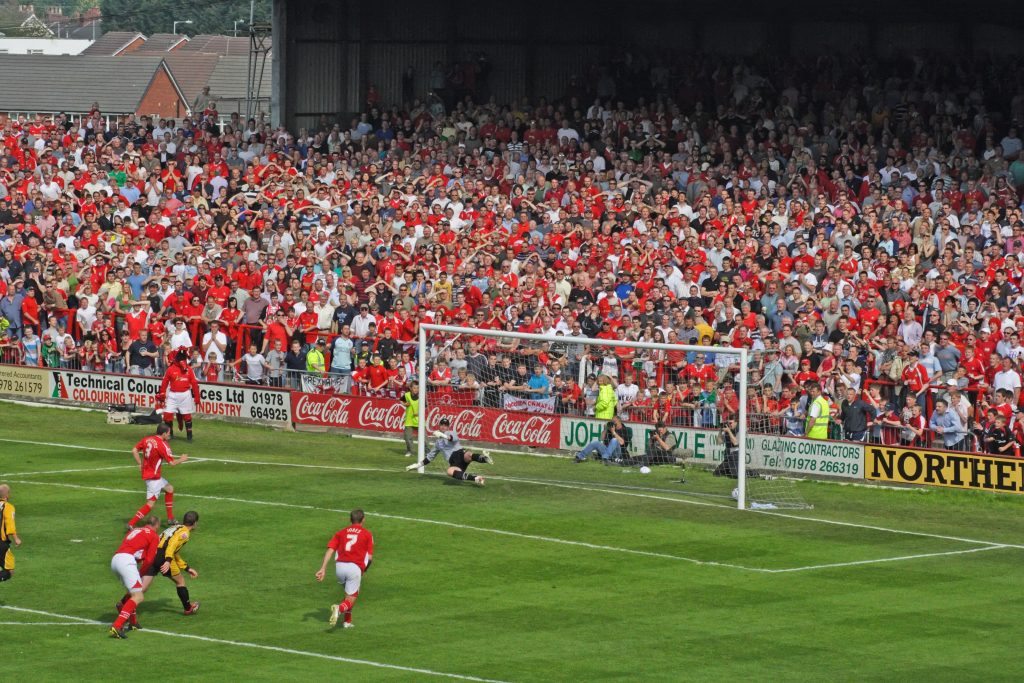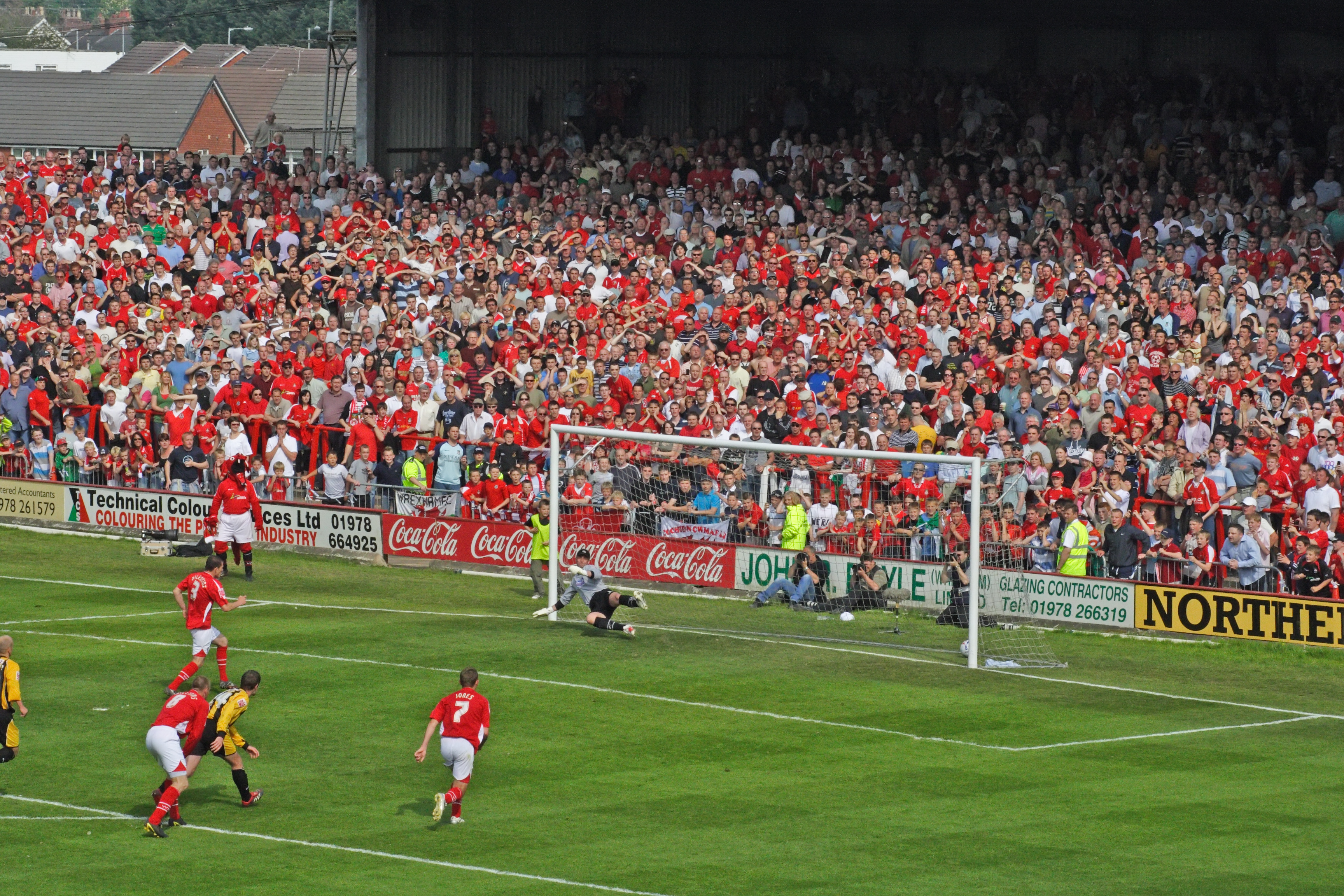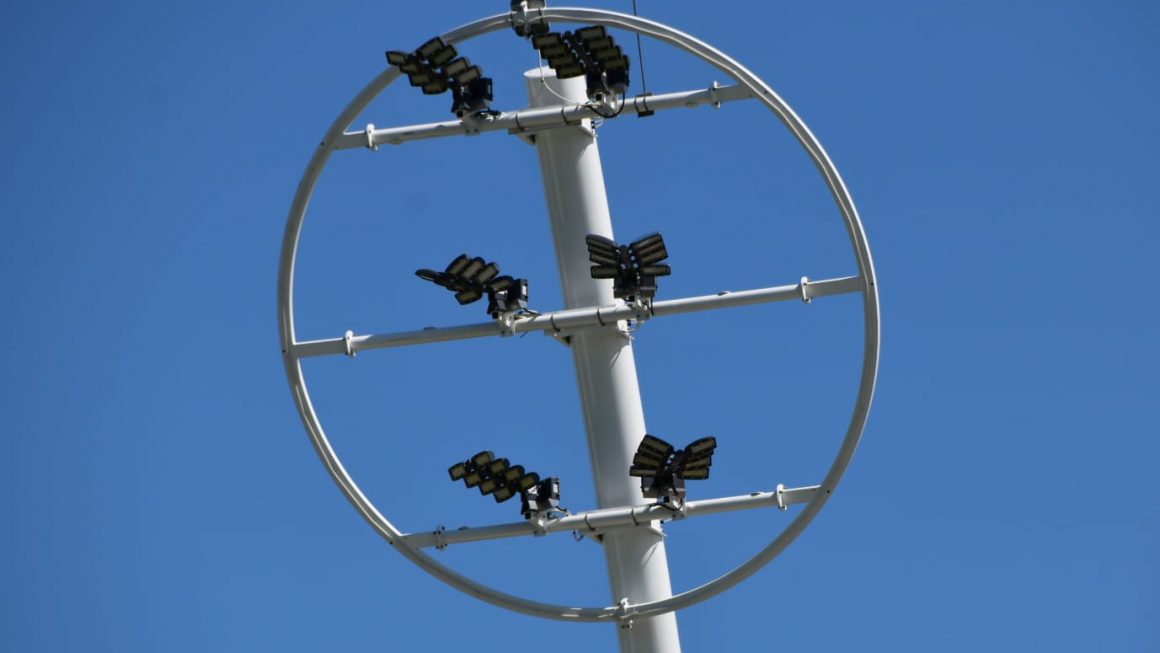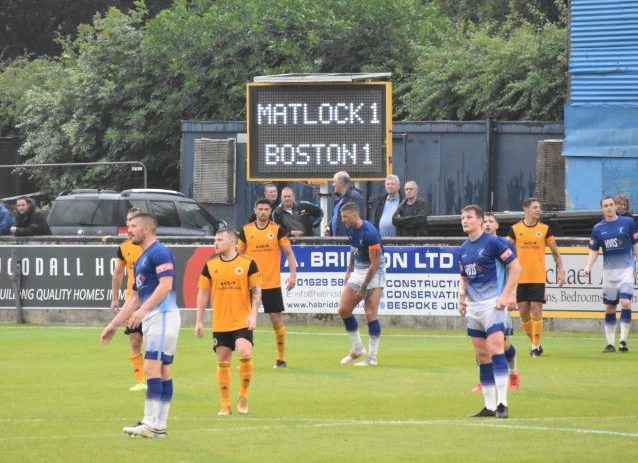Such was the drama of the occasion you didn’t notice it on the day, and it’s tricky to spot on the fuzzy YouTube footage, but Boston United’s faint hopes of remaining a Football League club were actually killed off by a rabona.
It had to be a rabona, didn’t it? Chris Llewellyn’s outrageous trick shot – headed home by Michael Proctor – didn’t just finish the Pilgrims off. It embarrassed them.
Marriot actually got a hand to the header, but his futile dive was pretty much the final act of Boston’s short Football League history: the goal put Wrexham beyond reach at 3-1, and Boston United, in more ways than one, were doomed.
It is now a decade since Wrexham’s biggest crowd for 27 years – some 12,374 people – crammed into the Racecourse on a glorious afternoon for what had been billed as the biggest game in the history of both clubs; a one-game, winner-takes-all relegation play-off. For the winner, the prize was Football League survival. For the loser, non-league oblivion.
Except, as we now know, it wasn’t quite as straightforward as that. Boston’s finances had been creaking for decades, and as their supporters converged in Wales the club was desperately close to collapse. It was hardly a secret: players had gone without wages, travelled to games in their own cars and were rumoured to have been considering strike action. Steve Evans could only name four substitutes. The Football League was so concerned about the situation it felt compelled to send a letter to the club reminding them they might just relegate them anyway. It was, in short, a holy mess.

So it was fitting that the coup de grâce was delivered by the on-loan Proctor, a player Boston had claimed to have signed for themselves weeks earlier, only for the transfer to fall apart in the kind of farcical circumstances that tend to surround clubs in financial disarray.
As Wrexham fans surged onto the pitch and Boston’s crestfallen players slumped to the floor, United bosses had already placed the club into administration, one more act of humiliation to add to that rabona. But in truth they had little choice. There was no money left.
The hangover from that sunny Welsh adventure haunts the Pilgrims to this day, but speak to fans and you swiftly discover that that many remember the day rather more fondly than you might expect. Perhaps it was the cathartic sense that the club could finally start afresh, or maybe it was simply the woozy combination of sun and Brains bitter, but many supporters actually seem to have enjoyed their day out.
Like many exiled Boston fans, James Smith wasn’t going to miss the game. “I didn’t get chance to go to many games back then, but felt this was one I had to be there,” he says. “I was staying with a friend who was going to her first ever game of football. It was a nice pre-match distraction, explaining to her just how average Boston were. Certainly good aversion therapy for the nerves. Safe to say she hasn’t been back to any football matches since.”
No surprise there. The 2006/2007 Boston side was a ragged, makeshift outfit with too many short term loan players. For his many faults, Steve Evans was well-versed in assembling winning teams; the Boston of 2007 was certainly not one of those.
“Getting to the last game was an achievement in itself” – Paul Ellender
Even so, Adam Upsall travelled from Leeds hoping for an unlikely escape, and, like James, was fully prepared for a game that reflected the perilous position both sides were in.
“The game was always going to be terrible – not as a spectacle, but as a sporting contest,” he says, acknowledging the club’s reputation for blowing games on the big stage. “Thinking back now about the absolute clown show of a circus, the outcome was inevitable. We were always going to lose.”
Elsewhere, United legend Chris Cook – on commentary duty for BBC Radio Lincolnshire – had opted to leave his suit at home and travel to the game in his replica shirt, all notions of press box impartiality discarded for the occasion. And, like Adam, he was just glad Boston were able to field a team.
“The club was in a right mess at that time,” he says. “With players and staff receiving no wages for a few months and the threat of administration looming, how could we expect the players to perform to levels that would keep them in the Football League? It was a disgrace that it was allowed to go that far.”
Even the United skipper Paul Ellender was surprised the club had made it. “The effort the players put in over the season under the circumstances showed how much the club meant to them,” he reflects. “Getting to the last game was an achievement in itself.”
But get there they did – somehow – and for Ellender one of the most vivid memories is that of the United supporters. “It was a very emotional day from start to finish really,” he recalls. “Especially coming out for the warm up before the game to see the amazing support we had from the fans.”
Not that the game was as empty of drama as it was quality. When Francis Green stabbed home a goal for the early lead, Boston supporters tucked under the low-hanging rafters of Wrexham’s away section turned into a seething mass of delirium. For a few minutes, for the first time in months, they had something to cling onto: hope.
“Hope,” Adam Upsall grumbles, “was the last thing any of us needed.”
Boston, of course, fell apart, but the jubilant scenes on the pitch as Wrexham fans mobbed their players never threatened to turn ugly, and when the attention of the home supporters turned to the 450 Boston fans it was not to goad but to applaud.
Wrexham sang to Boston, and Boston sang back.
“It was all a bit daunting,” remembers Cook. “We were sat in the middle of a lot of Wrexham fans in the main stand, but they were brilliant with us – especially after they had won. The crowd was massive and the support from Boston was brilliant.”
James Smith concurs. “I was proud of the fans and the support we gave that day,” he says. “The players all gave a proper shift that day. Franny Green’s goal was great, I thought we could do it, but then the penalty came and it all slowly sunk away, like a bad dream that you can’t wake up from. At full time I was just numb and empty, and then I’m afraid to say just angry at the management who’d let us down. All those signings and promises built on no foundations.”
Still, however fondly Boston fans recall the reception they received that day, the manner in which the club itself had conducted itself that season left many Wrexham supporters feeling their opponents got exactly what they deserved.
Carl Austin was one such supporter. “Wrexham fans were very bitter with what went on with Steve Evans and the chairman,” he says. “We felt that Boston should have been relegated before the game. Boston had points deducted afterwards, but that meant nothing at the time.
“But,” he concedes, “the Boston fans on the day were amazing. I remember that stand being a sea of amber and black. It actually took the edge off the win for a lot of Wrexham fans because it meant you went down, and although we hated Steve Evans it wasn’t the fault of the fans. I was gutted for the Boston supporters. And you showed a great deal of class when applauding us.”
Still, plenty of others were pleased to see the back of Boston.
“Few will mourn the Pilgrims’ regress,” spat Jeremy Alexander in the Guardian, gleefully noting the poetic justice of Dagenham and Redbridge – denied five years earlier – replacing Boston in the league.
For the squad, it was the last time many of them played together. “I think a few tears were shed in the dressing room afterwards,” admits Ellender, who was the only member of the playing staff to return to the club the following season following its acquisition by Chestnut Homes.
Of course, there was to be no happy ending for Wrexham either, relegated themselves just a year later under similarly grim circumstances. The last decade for both clubs has been one of reinvention and uncomfortable acclimatisation to their new place in the pecking order – one that has not come easy to either set of supporters.
Mirroring the frustration of Pilgrims fans, Carl Austin laments Wrexham’s lost decade. “Apart from making the playoffs twice, it has been terrible,” he says. “I really hate seeing teams like Fleetwood, Forest Green and now Fylde who are just bankrolled by sugar daddies. It’s killing football. Non-league needs financial fair play.”
Having been stung badly by the vagaries of irresponsible owners it is unsurprising that the theme of sustainability is now important to the two clubs. It is one that Chris Cook, now on the board at Boston, fully embraces.
“Most clubs rely on wealthy investors to come in and gamble with success or failure,” he says. “And if they fail they usually slope off and leave the mess to be cleaned up by someone else – or the people they trampled over to get to where they were. In the next couple of years, when the new stadium is up and running, our club will become sustainable and be a massive part of the community. The stadium will be a great gateway into the town.”
Cook’s enthusiasm is certainly infectious, and as the diggers churn away in the flat fields of Wyberton, there is, finally, a real sense that Boston United are ready to move on from that barmy, sun-soaked day ten years ago.
A day that no-one wishes to ever repeat, but a day that few regret, and even fewer will forget.
Written by Pete Brooksbank
This article was originally published by the Boston Standard on the game’s tenth anniversary



